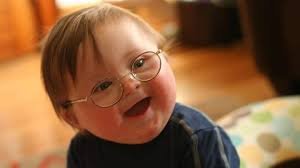
1) What is Down syndrome? What is its prevalence in Turkey?
Down syndrome is a genetic disorder resulting from the presence of an extra chromosome in the 21st chromosome pair of a person as a result of a genetic disorder.
Down syndrome is characterized by structural and functional changes in the body. The combination of minor and major differences in the body is exhibited structurally.
Down syndrome is often associated with mental disorders and differing physical development such as typical facial appearance. Physical features are slanting small eyes, flat nose, short fingers, curved little finger, thick nape, single line on the palm, the big toe is wider than the other fingers. They often have problems such as mild or moderate learning difficulties. Their development is often retarded. Delayed gait and speech disorders are common.
Down syndrome is seen in one out of every 800 babies born. 1500 babies with down syndrome are born in Turkey every year. Down syndrome affects people of all ages, races, religions and economic circumstances. It is estimated that there are around 100,000 people with Down syndrome living in Turkey.
2) What are the problems faced by families with children with Down syndrome?
Because of their mental retardation and developmental delays, DS children need more parental support and care. They often have lifelong family support. Since it is a chronic condition, it is difficult for families to accept this condition. However, early educational and physical therapy support is important in terms of eliminating developmental delay.
3) What should be considered in the education of children with Down syndrome?
Education should be in the form of individual and group education in terms of mental retardation and language and speech education in terms of language development. In individual training, skills such as taking commands, self-care skills, toilet training, etc. should be targeted. In language and speech education, goals such as increasing the number of words, correct pronunciation of sounds, fluent speaking are studied.
4) What is the function of the sibling figure in the education of children with Down syndrome? Does the sibling function help with education?
DS people often benefit from having a sibling. Siblings serve as a model for children and enable their mental, language and social development to be better. In addition, the help provided by siblings in the care of DS children in older ages is facilitating and motivating for parents.
5) Is participation in social life other than special education effective in the rehabilitation of children with Down syndrome?
While social support is important for all children, it is especially important for children with mental problems. Although social skills are generally good in DS people, they may be ostracized by the society due to speech and behavior problems. In fact, it should be ensured that they can be integrated into the right society and have a place in the society. For this, everyone should be supportive, not be prejudiced against these children and not be afraid.
6) What would you recommend to families with children with Down syndrome for their child’s participation in social life?
The social life of DS children should start at a young age. Parents should not be ashamed of their children and should not forget that they are members of society. They should be sent to kindergarten, kindergarten, sports and other activities with their peers to support their social life. Also, interacting with other DS children leads them to realize that they are not alone in the world, but that there is someone else like them in the world. This usually yields positive results.
7) Do families with children with Down syndrome also need psychological or social support?
Being a chronic problem and demanding more attention and care than other children can be exhausting for DS families. For this reason, it is important for these families to receive psychosocial support in terms of both child and parent mental health. These families need to be supported by their immediate environment, administrators and mental health workers. In addition, the development of children with DS should be followed by a child psychiatrist and they should receive help in terms of problems that may arise.

